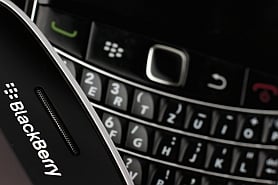Deal or no deal? When it comes to the proposed BlackBerry takeover by South Korean electronics giant Samsung, the better questions is doable or not doable?
Markets went into a frenzy when rumours resurfaced early this year that Samsung Electronics was going to make a run at the eponymous Canadian smartphone maker. But foreign investment lawyers agree on one thing: shareholders won’t have the last word on this one. Any foreign acquisition of BlackBerry will trigger a national security review.
“In my opinion a sale to any foreign entity, even the friendliest national foreign entity, would trigger a national security review because this actually is sensitive from a national security point of view,” says James Musgrove, co-chair of the competition and antitrust practice at McMillan LLP.
Based in Waterloo, Ont., BlackBerry produces what is the smartphone of choice for many senior government and military agencies, not just in Canada but around the world, Musgrove points out, with US President Barrack Obama refusing to give his up even after moving into the Oval Office.
“There’s terrific back-end security in them; that’s why governments tend to use them. So the question will arise in the government’s mind: ‘Okay, foreigners will theoretically have access to this data if they want to. Should we worry about that? Let’s understand it better, we’d better review it.”
Ottawa amended the Investment Canada Act in 2009 to add a national security review regime to be administered separately from the general “net benefit” test. It permits the government to order a national security review for any investment by a non-Canadian that may be “injurious to national security.”
It is a highly secretive process carried out by a committee of senior officials that reportedly includes the heads of two spy agencies and Prime Minister Stephen Harper’s national security advisor. While Investment Canada has outlined some steps in the process, it hasn’t revealed any details about the committee or laid out the kinds of things that would cause a transaction to be disallowed.
“The threshold is intentionally loosely defined,” says Paul Collins, head of Stikeman Elliott’s competition and foreign investment group. “There’s no definition of national security per se. I think the government’s view is: ‘We know it when we see it.’”
While that can make it challenging to advise clients on their chances of getting a deal through, he says, any foreign company making a bid for BlackBerry would be prepared for close scrutiny on the security front.
In 2013, Ottawa rejected a takeover of Manitoba Telecom Services Inc. by an Egyptian billionaire. By way of explanation, the government released this statement: “MTS Allstream operates a national fibre-optic network that provides critical telecommunications services to businesses and governments, including the Government of Canada.”
BlackBerry is in the telecoms space, and Collins says “that’s a very sensitive area for this government on several levels — both domestically and in terms of foreign investment. You’re talking about the sharing of communication.”
It’s assumed a national security review would look at the company’s estimated 44,000 patents, its proprietary technology and at any operations that might be critical to government in Canada and its key allies.
Canada would not be the only country to put the sale under a security microscope. It’s likely the transaction would also require approval from the Committee on Foreign Investment in the United States, which reviews deals for national security implications.
At the end of the day, is BlackBerry ultimately saleable to a foreign buyer? Collins says yes, but “it really depends who. I certainly wouldn’t rule out that possibility by any stretch, although it would be an extremely high-profile, delicate transaction to stickhandle through the process. We’re not accustomed to saying ‘non-starter’ very often, and I don’t think it’s merited here, but it would be challenging.”
Musgrove says the country of origin of the prospective buyer could shape the outcome, with a Chinese or Russian buyer viewed differently from an American or British purchaser.
“There are at three distinct buckets of countries from a security standpoint and I think it makes a difference,” he says. “The first is countries where relations are fraught, where I think a sale would likely fail a national security review. The second is countries that are very close allies, the so-called Five Eyes countries [Canada, the US, the UK, Australia and New Zealand] where I think a sale would ultimately pass a national security review. Then there’s a middle bucket of countries, where I actually don’t know.”
South Korea, he says, falls into the last category. So, doable deal or no doable deal? It’s still anyone’s guess.




